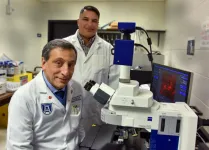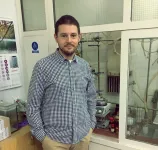(Press-News.org) EAST LANSING, Mich. - An international team of researchers led by Michigan State University's Morteza Mahmoudi has developed a new method to better understand how nanomedicines -- emerging diagnostics and therapies that are very small yet very intricate -- interact with patients' biomolecules.
Medicines based on nanoscopic particles have the promise to be more effective than current therapies while reducing side effects. But subtle complexities have confined most of these particles to research labs and out of clinical use, said Mahmoudi, an assistant professor in the Department of Radiology and the Precision Health Program.
"There's been a considerable investment of taxpayer money in cancer nanomedicine research, but that research hasn't successfully translated to the clinic," Mahmoudi said. "The biological effects of nanoparticles, how the body interacts with nanoparticles, remain poorly understood. And they need to be considered in detail."
Mahmoudi's team has now introduced a unique combination of microscopy techniques to enable more detailed consideration of those biological effects, which the researchers described in the journal Nature Communications, published online on Jan. 25.
The team's methods let researchers see important differences between particles exposed to human plasma, the cell-free part of blood that contains biomolecules including proteins, enzymes and antibodies.
These biological bits latch onto a nanoparticle, creating a coating referred to as a corona (not to be confused with the novel coronavirus), the Latin word for crown. This corona contains clues about how nanoparticles interact with a patient's biology. Now, Mahmoudi and his colleagues have shown how to get an unprecedented view of that corona.
"For the first time, we can image the 3-D structure of the particles coated with biomolecules at the nano level," Mahmoudi said. "This is a useful approach to get helpful and robust data for nanomedicines, to get the kind of data that can affect scientists' decisions about the safety and efficacy of nanoparticles."
Although work like this is ultimately helping move therapeutic nanomedicines into the clinic, Mahmoudi is not optimistic that broad approval will happen any time soon. There's still much to learn about the particles. Furthermore, one of the things that researchers do understand very well -- that minute variations in these diminutive drugs can have outsized impact -- was underscored by this study.
The researchers saw that the coronas of nanoparticles from the same batch, exposed to the same human plasma, could provoke a variety of reactions by a patient to a single dose.
Still, Mahmoudi sees an opportunity in this. He believes these particles could shine as diagnostics tools instead of drugs. Rather than trying to treat diseases with nanoscale medicine, he believes that persnickety particles would be well suited for the early detection of disease. For example, Mahmoudi's group has previously shown this diagnostic potential for cancers and neurodegenerative diseases.
"We could become more proactive if we used nanoparticles as a diagnostic," he said. "When you can detect disease at the earlier stages, it becomes easier to treat them."
INFORMATION:
(Note for media: In online coverage, please include a link to the original paper: http://dx.doi.org/10.1038/s41467-020-20884-9)
Michigan State University has been working to advance the common good in uncommon ways for more than 160 years. One of the top research universities in the world, MSU focuses its vast resources on creating solutions to some of the world's most pressing challenges, while providing life-changing opportunities to a diverse and inclusive academic community through more than 200 programs of study in 17 degree-granting colleges.
For MSU news on the Web, go to MSUToday. Follow MSU News on Twitter at twitter.com/MSUnews.
Even before public announcements of the first cases of COVID-19 in Europe were made, at the end of January 2020, signals that something strange was happening were already circulating on social media. A new study of researchers at IMT School for Advanced Studies Lucca, published in END ...
The rate at which ice is disappearing across the planet is speeding up, according to new research.
And the findings also reveal that the Earth lost 28 trillion tonnes of ice between 1994 and 2017 - equivalent to a sheet of ice 100 metres thick covering the whole of the UK.
The figures have been published today (Monday, 25 January) by a research team which is the first to carry out a survey of global ice loss using satellite data.
The team, led by the University of Leeds, found that the rate of ice loss from the Earth has increased markedly within the past three decades, from 0.8 trillion tons per year in the 1990s to 1.3 trillion tons per year by 2017.
Ice melt across the globe ...
Female childhood cancer survivors face a lower likelihood of becoming pregnant than women in the general population, but once pregnant, they are not more likely to undergo an abortion. The findings come from a new study published early online in CANCER, a peer-reviewed journal of the American Cancer Society.
Cancer survivors might be reluctant to start a family due to concerns for their children's health as well as the potential recurrence of their own cancer. This could lead to a greater likelihood of induced abortions in female survivors who become pregnant.
To examine whether pregnancies of childhood cancer survivors are more likely to end with ...
AUGUSTA, Ga. (January 25, 2021) - Immediately after a traumatic brain injury and as long as one year later, there are increased levels of immune cells called ILCs in the brain promoting inflammation, which can worsen brain damage, scientists report.
They also report for the first time that the cell energy sensor AMPK is a brake that can stop what becomes a chronic state of destructive inflammation driven by these ILCs, or innate lymphoid cells.
"We think ILCs are kind of a master regulator of all that inflammation happening within the brain," says Dr. Krishnan Dhandapani, neuroscientist in the Department of Neurosurgery at the Medical College of Georgia at Augusta University. "It's like the ...
These results were published in the prestigious journal ChemSusChem and thanks to the remarkable reviews, the paper was ranked among the top five percent publications in the field, thus earning a Very Important Paper (VIP) status. Furthermore, the editorial board featured this study on its cover.
Plastic pollution has become one of the most complex environmental issues, especially in the context of increasing production and demand for plastic materials. While innovations in polymer chemistry have radically changed our lives in the mid-20th century, the outstanding properties of plastics such as durability, chemical stability, strength and many other pose a serious problem ...
PULLMAN, Wash. - Man's best friend might actually belong to a woman.
In a cross-cultural analysis, Washington State University researchers found several factors may have played a role in building the mutually beneficial relationship between humans and dogs, including temperature, hunting and surprisingly - gender.
"We found that dogs' relationships with women might have had a greater impact on the dog-human bond than relationships with men," said Jaime Chambers, a WSU anthropology Ph.D. student and first author on the paper published in the Journal of Ethnobiology. "Humans were more likely to regard dogs as a type of person if the dogs had a special ...
Arctic sea ice is rapidly diminishing due to global warming, and scientists have found that sea ice dynamics have a big impact on circulation and precipitation patterns in Arctic Alaska, which lies at a climatological crossroads between the Arctic and North Pacific Oceans. Recent studies--most of which focus on current trends in the region and on what will happen in the future--have shown that circulation patterns in the Arctic and North Pacific Oceans influence one another.
Doctoral candidate Ellie Broadman of Northern Arizona University's School of Earth and Sustainability wanted to learn about this relationship on a longer timescale, so she developed and led a ...
A group of scientists is calling on governments to consider the continued use of strict control measures as the only way to reduce the evolution and spread of new COVID-19 variants.
The experts in evolution, virology, infectious disease and genomics - at the University of East Anglia (UEA), Earlham Institute and University of Minnesota - warn that while governments are negotiating a "precarious balance" between saving the economy and preventing COVID-19 fatalities, stronger action now is the best way to mitigate against more serious outcomes from such virulent strains later.
While COVID-19 vaccine deployment is now underway, a threat to vaccine effectiveness comes from other emerging strains, both existing - such as the UK, South Africa and Brazil variants ...
New estimates reveal extent of the health burden of armed conflict--affecting at least 630 million women and children worldwide in 2017, and contributing to more than 10 million deaths among children under 5 years of age over 20 years.
Changing nature of war is a growing threat to humanitarian access and the provision of essential health services for women and children, but responses in countries like Syria, Pakistan, and Colombia may provide context-specific innovative ways forward.
Armed conflicts are becoming increasingly complex and protracted and a growing threat to humanitarian access and the delivery of essential health services, affecting at least 630 million women and ...
Dramatic changes were seen in the delivery of radiotherapy treatments for cancer during the first wave of the coronavirus pandemic in England.
Much shorter radiotherapy courses were delivered, treatments were delayed where it was safe to do so and some increases were seen in order to compensate for reduced surgical capacity.
Experts believe the changes reflect an impressive adaption of services by the NHS, and that the overall impact on cancer outcomes is likely to be modest.
The new research, led by the University of Leeds, with Public Health England and the Royal College of Radiologists, reveals that there was a decrease in radiotherapy treatment courses of 19.9% in April, 6.2% in May, and 11.6% in June 2020, compared with the same months the previous year.
These decreases equated ...


